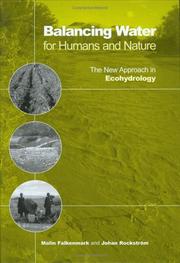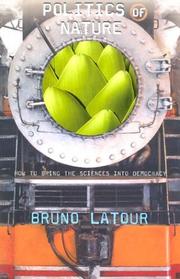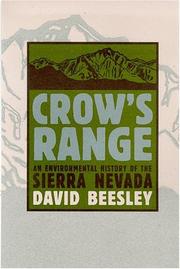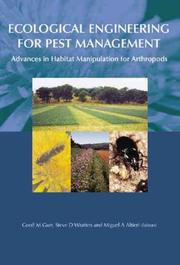| Listing 1 - 10 of 37 | << page >> |
Sort by
|

ISBN: 1566705991 Year: 2004 Publisher: Boca Raton Lewis
Abstract | Keywords | Export | Availability | Bookmark
 Loading...
Loading...Choose an application
- Reference Manager
- EndNote
- RefWorks (Direct export to RefWorks)

Abstract | Keywords | Export | Availability | Bookmark
 Loading...
Loading...Choose an application
- Reference Manager
- EndNote
- RefWorks (Direct export to RefWorks)
Book

Year: 2004 Publisher: Reston VA American Society of Civil Engineers
Abstract | Keywords | Export | Availability | Bookmark
 Loading...
Loading...Choose an application
- Reference Manager
- EndNote
- RefWorks (Direct export to RefWorks)
Proceedings of the 2004 World Water and Environmental Resources Congress, held in Salt Lake City, Utah, June 27-July 1, 2004. Sponsored by the Environmental and Water Resources Institute of ASCE. This collection contains 493 papers that critically examine past goals and practices and provide fresh concepts and models to help engineers build on past accomplishments while providing insight on how to avoid or mitigate past water resources and environmental mistakes. Almost every significant topic important to water resources and environmental engineering professionals is covered. Additionally, papers from six specialty symposia sharply focus on specific, concentrated areas of interest: arid lands; best management practices (BMP) technology; groundwater issues; international water resources issues; river restoration and urban streams; and the 6th Annual Symposium on Water Distribution Systems Analysis. The depth and variety of subjects contained in this collection make it a vital resource for professionals, practitioners, researchers and anyone else involved with water and environmental resources.
Water quality management --- Ecological engineering --- Environmental engineering --- Civil & Environmental Engineering --- Engineering & Applied Sciences --- Environmental Engineering --- Water resources --- Water management --- Salt water --- Resource management --- Urban areas --- Water supply systems --- Ecological restoration --- Urban and regional development --- Utah --- United States

ISBN: 0521546184 1139883208 1107385962 110738396X 1107390397 1107398800 1107387477 0511805551 9781461941491 1461941490 9780511805554 9781107387478 0521837324 9780521837323 9780521546188 9781139883207 9781107385962 9781107390393 9781107398801 Year: 2004 Publisher: Cambridge : Cambridge University Press,
Abstract | Keywords | Export | Availability | Bookmark
 Loading...
Loading...Choose an application
- Reference Manager
- EndNote
- RefWorks (Direct export to RefWorks)
People of European descent form the bulk of the population in most of the temperate zones of the world - North America, Australia and New Zealand. The military successes of European imperialism are easy to explain; in many cases they were a matter of firearms against spears. But, as Alfred Crosby maintains in this highly original and fascinating book, the Europeans' displacement and replacement of the native peoples in the temperate zones was more a matter of biology than of military conquest. European organisms had certain decisive advantages over their New World and Australian counterparts. The spread of European disease, flora, and fauna went hand in hand with the growth of populations. Consequently, these imperialists became proprietors of the world's most important agricultural lands. Now in a second edition with a new preface, Crosby revisits his now-classic work and again evaluates the global historical importance of European ecological expansion.
Biogeography. --- Europeans --- Human ecology. --- Human geography. --- Migrations. --- Biogeography --- Human ecology --- Human geography --- Areography (Biology) --- Geographical distribution of animals and plants --- Species --- Species distribution --- Biology --- Geography --- Anthropo-geography --- Anthropogeography --- Geographical distribution of humans --- Social geography --- Anthropology --- Ecology --- Environment, Human --- Human beings --- Human environment --- Ecological engineering --- Nature --- Migrations --- Geographical distribution --- Social aspects --- Effect of environment on --- Effect of human beings on --- Arts and Humanities --- History

ISBN: 1853839264 1853839272 Year: 2004 Publisher: London Earthscan
Abstract | Keywords | Export | Availability | Bookmark
 Loading...
Loading...Choose an application
- Reference Manager
- EndNote
- RefWorks (Direct export to RefWorks)
Ecohydrology. --- Human ecology. --- Water use. --- Environmental Sciences and Forestry. Water Management --- Water Supply --- Water Supply. --- Ecohydrology --- Human ecology --- Water use --- Use of water --- Utilization of water --- Water --- Water utilization --- Ecology --- Environment, Human --- Human beings --- Human environment --- Eco-hydrology --- Utilization --- Social aspects --- Water-supply --- Ecological engineering --- Human geography --- Nature --- Aquatic ecology --- Hydrology --- Effect of environment on --- Effect of human beings on
Periodical
ISSN: 21538905 17180198 Year: 2004 Publisher: Charlottesville Philosophy documentation center
Abstract | Keywords | Export | Availability | Bookmark
 Loading...
Loading...Choose an application
- Reference Manager
- EndNote
- RefWorks (Direct export to RefWorks)
Environmental sciences --- Human ecology --- Philosophy --- Philosophy. --- Ecology --- Environment, Human --- Human beings --- Human environment --- Ecological engineering --- Human geography --- Nature --- Environmental science --- Science --- Social aspects --- Effect of environment on --- Effect of human beings on --- Sciences de l'environnement --- Écologie humaine --- Environmental Sciences --- Philosophie --- General and Others

ISBN: 9780674013476 0674039963 9780674039964 0674013476 9780674012899 0674012895 Year: 2004 Publisher: Cambridge (Mass.) Harvard University Press
Abstract | Keywords | Export | Availability | Bookmark
 Loading...
Loading...Choose an application
- Reference Manager
- EndNote
- RefWorks (Direct export to RefWorks)
A major work by one of the more innovative thinkers of our time, Politics of Nature does nothing less than establish the conceptual context for political ecology--transplanting the terms of ecology into more fertile philosophical soil than its proponents have thus far envisioned. Bruno Latour announces his project dramatically: "Political ecology has nothing whatsoever to do with nature, this jumble of Greek philosophy, French Cartesianism and American parks." Nature, he asserts, far from being an obvious domain of reality, is a way of assembling political order without due process. Thus, his book proposes an end to the old dichotomy between nature and society--and the constitution, in its place, of a collective, a community incorporating humans and nonhumans and building on the experiences of the sciences as they are actually practiced. In a critique of the distinction between fact and value, Latour suggests a redescription of the type of political philosophy implicated in such a "commonsense" division--which here reveals itself as distinctly uncommonsensical and in fact fatal to democracy and to a healthy development of the sciences. Moving beyond the modernist institutions of "mononaturalism" and "multiculturalism," Latour develops the idea of "multinaturalism," a complex collectivity determined not by outside experts claiming absolute reason but by "diplomats" who are flexible and open to experimentation.
Political ecology. --- Social ecology --- Green movement --- Green movement. --- Human ecology. --- Science --- Science and society --- Sociology of science --- Ecology --- Environment, Human --- Human beings --- Human environment --- Ecological engineering --- Human geography --- Nature --- Ecologism --- Environmental action groups --- Environmental groups --- Environmentalism --- Political ecology --- Sustainable living --- Social aspects. --- Social aspects --- Effect of environment on --- Effect of human beings on

ISBN: 9780340720127 9781444118995 1444118994 0340720123 9780340720134 0340720131 0340720123 0340720131 0203784499 9780203784495 1282666959 9781282666955 9786612666957 6612666951 1134664931 Year: 2004 Publisher: London New York Arnold Distributed in the United States of America by Oxford University Press
Abstract | Keywords | Export | Availability | Bookmark
 Loading...
Loading...Choose an application
- Reference Manager
- EndNote
- RefWorks (Direct export to RefWorks)
Bringing together many of the leading human geographers from around the English-speaking world, Envisioning Human Geographies offers a series of personal visions for the future of human geography. The result is a vigorous and far-sighted debate about what human geography could and should be concerned with in the twenty-first century.The individual contributors develop their arguments to address the shape and direction of human geographies, with each chapter looking forward and envisioning an intellectual future for the subject. The result is a set of powerful statements written around the themes of:·space·nature ·enclosure ·political-economy·non-representation ·post-colonialism ·feminism·post-structuralism ·computation·morality·spirituality ·activism. The statements are tied via an introduction that discusses the ideological, academic and aesthetic prompts that fire the human geographical imagination.Envisioning Human Geographies maps out important new territories of enquiry for human geography, and is essential reading for all students studying the nature and philosophy of the subject.
Human geography --- Human ecology --- Human geography. --- Human ecology. --- Ecology --- Environment, Human --- Human beings --- Human environment --- Ecological engineering --- Nature --- Anthropo-geography --- Anthropogeography --- Geographical distribution of humans --- Social geography --- Anthropology --- Geography --- Social aspects --- Effect of environment on --- Effect of human beings on --- Geografie --- Sociale en economische geografie --- Algemeen.

ISBN: 0874176344 9780874176346 0874175623 9780874175622 9780874177022 0874177022 Year: 2004 Publisher: Reno University of Nevada Press
Abstract | Keywords | Export | Availability | Bookmark
 Loading...
Loading...Choose an application
- Reference Manager
- EndNote
- RefWorks (Direct export to RefWorks)
"Historian David Beesley examines the history of the Sierra Nevada's geologic beginnings and various ecological communities. Using a wide range of sources, including the records of explorers and early settlers, scientific and government documents, and newspaper reports, Beesley offers a lively, readable, and deeply informed account of the history, environmental challenges, and political controversies that lie behind the breathtaking scenery of the Sierra."--Jacket.
Conservation of natural resources --- Human ecology --- Conservation of resources --- Natural resources --- Natural resources conservation --- Resources conservation, Natural --- Environmental protection --- Natural resources conservation areas --- Ecology --- Environment, Human --- Human beings --- Human environment --- Ecological engineering --- Human geography --- Nature --- Conservation --- Social aspects --- Effect of environment on --- Effect of human beings on --- Sierra Nevada Region (Calif. and Nev.) --- Environmental conditions. --- E-books

ISBN: 1283156172 9786613156174 0643098410 9780643098411 9781283156172 0643090223 9780643090224 Year: 2004 Publisher: Collingwood, Vic. CSIRO
Abstract | Keywords | Export | Availability | Bookmark
 Loading...
Loading...Choose an application
- Reference Manager
- EndNote
- RefWorks (Direct export to RefWorks)
Details the latest techniques in manipulating farm habitats to enhance pest control in crops worldwide.
Agricultural pests --- Ecological engineering. --- Environmental engineering. --- Arthropod pests --- Agricultural ecology. --- Agriculture --- Agroecology --- Ecology --- Permaculture --- Arthropoda --- Invertebrate pests --- Environmental control --- Environmental effects --- Environmental stresses --- Engineering --- Environmental health --- Environmental protection --- Pollution --- Sustainable engineering --- Ecotechnology --- Environmental management --- Human ecology --- Nonchemical control of agricultural pests --- Biological control. --- Control. --- Environmental aspects --- Nonchemical control
| Listing 1 - 10 of 37 | << page >> |
Sort by
|

 Search
Search Feedback
Feedback About UniCat
About UniCat  Help
Help News
News